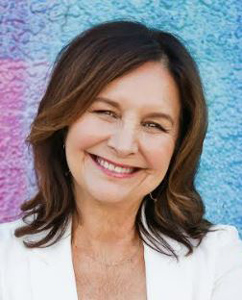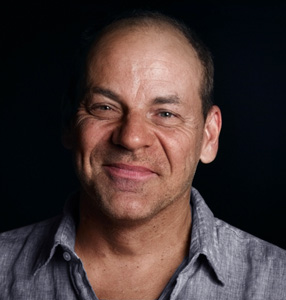
This interview article was originally published on the Neurodiversity Press Blog and has been republished with permission.
Michael John Carley: Elaine, tell me about your son, Neal.

Elaine Hall
Elaine Hall: Neal Katz is a 28-year-old autistic multi-modality communicator who uses gestures, vocalizations, some ASL, AAC, and supported typing to communicate his wants, needs, and complex ideas. He lives in his own apartment with a roommate, has 24/7 staff, and loves to take long walks to self-regulate. He enjoys nature, the beach and chocolate. He has a beautiful, sensitive soul and is loved by many. Through Neal’s typing, he communicates complex ideas, intense feelings.
As an emissary for autism, Neal has made numerous presentations including being one of the first multi-modality communicators to present at the United Nations for World Autism Awareness Day (2014 and 2019.) Neal is the inspiration for The Miracle Project an inclusive theater and film program I created for neurodivergent individuals with and without disabilities. He was also the founding fellow of Shemesh Organic Farms, now a successful non-for-profit organization, employing nearly 50 adults with disabilities.
Neal flourishes in inclusive environments where he is understood, seen, and respected for his humor, his insight, and his love. When he does not receive the proper supports, Neal will descend to the bottom of his box which may result in harming himself and/or others, and destruction of property. Actions to which he is later very remorseful affecting his sense of self. At these times he might be categorized as ‘profoundly autistic.”
Recently, on a Miracle Project panel, when asked what Neal wants audiences to take away from his performances and presentations, he responded, “I wish for everyone in the world to be happy.”

Michael John Carley
MJC: You remember all the “cure wars” with Autism Speaks and the like way back in the 00s. It seems to be the same crowd that’s pushing this distinction of “Profound Autism” all these years later. But is “Profound Autism” the same insistence on the medical model of disability as “cure” talk was, or do you think it’s different (and if so, how)?
Elaine: Perhaps with the loss of the Asperger’s diagnosis in the DSM, our autistic community has been given a greater challenge to distinguish the nuances within the spectrum. I do feel it is different than the 00’s idea of the cure wars mentality that saw all neurodivergent individuals as ‘diseased.’
As Neal has grown into adulthood, I have veered as much into the disability community as I am part of the autism community. (Thanks to suggestions by my dear friends like you and Stephen Shore, I also now identify as neurodivergent myself, which becomes a larger umbrella for all of us “abbynormal” brains.) Neal has taught me that there is no shame in being called disabled. From early on, he has stated clearly that he is autistic, apraxic, and disabled. He does not shy away from being called disabled; he has expressed thru his typing that he wishes people would simply ask him what is going on with his body moves and sensitivities rather than just stare at him. He knows that he does not speak, nor communicate in a way that the majority of the population does, and he does not look at this way of being as a negative label, but as he has told me before, a fact.
Is this “profound autism?” Rather I think he is autistic and has disabilities that profoundly impact his way of being in the world when not given the proper communication support. I think the goal of any parent is to be able to provide the greatest level of support for their child and if a label helps them do this then for them such a label may be helpful. I cannot speak for anyone else as I can only speak for myself and individual circumstances. As much as is possible I would encourage individuals with more profound needs to be the ones who are asked to answer this question.
Does labeling help or hurt our cause? When I spoke at the UN in 2014, I requested of the audience that they stop using the terms “high functioning and low functioning autism,” to describe a person on the spectrum. Without us realizing it, “Profound autism” may be a return to this type of labeling. What I think would be more helpful would be to describe an individual’s level of support needs as “profound” which directly addresses the necessary support while taking away any negative connotation about the value or perceived limitations of the person.
Robert Naseef brilliantly asks us not to Divide the Autism Spectrum and to be thinking of all of us as unified. I agree 100% that the most important discussion rather than adding a new label, is to unify in order to get the necessary support so that individuals can be the best that they can be.
The reason I am very attuned to the disability community is that our advocacy umbrella becomes larger when we explore the wins from the disability community as well as the battles towards better understanding and appropriate interventions.
Just recently I was part of a panel on self-determination where a deaf colleague presented on how ASL and communication is not seen as a priority for individuals who are deaf and therefore not funded by the state. Similarly, behavior intervention is funded in our state, however communication support is not. This is so absurd to me as my son’s behavior is directly related to being understood by his caregivers and his ability to express his wants, needs and complex thoughts and feelings.
As my mentor and our dear friend Barry Prizant has always said, “all behavior is communication.” So what are our children communicating when they headbang, when they are biting? These are not random things. Are these sensory needs? I remember a parent telling me that their child was headbanging and having all kinds of “behaviors” and that traditional behavior therapies were unsuccessful in treating the behavior; when the reality was this child had a toothache. When the toothache was treated the “behavior” stopped. I believe that we need to be putting our resources into really focusing on communication for those who have challenges in this arena.
Pointing fingers, blaming each other, name calling etc. only weakens us as a community and takes away from the needed strength and energy that we need to educate and advocate to the naysayers.
Recently, a group of non-speaking autistic young adults from The Miracle Project and I were invited to present at a neuroscience conference. We showed a music video where multimodality communicators wrote the lyrics to the song, created the concept, directed, acted in, and danced in the music video. The professionals in the audience were blown away by what they saw on the screen. The video clearly demonstrated what is possible for individuals whom some may label “profound autistic young adults” when provided the right environment and supports to thrive.
Although the neuroscience conference was informative revealing latest research on potential origins of autism and cures, i.e. seeking to find a specific autism gene, etc., there was little discussion on topics that could enhance the quality of life for autistic young adults today. I dream of a day when there are equal research dollars spent on innovations and modalities that help to prepare those who may have more disabilities to lead their best lives.
I also believe that all autism conferences should include non-speaking autistic presenters. With their voices being as prominent as our usual subjects. These are the voices we need as many of them, my son included, prior to getting the appropriate communication and sensory supports could have been deemed “profound autistic” and are now leaders in the community.
MJC: That’s your professional opinion. Now what was your personal, instinctive, reaction, as Neal’s mom, to this concept (of “Profound Autism”)?
Elaine: As Neal’s mom I have tremendous compassion for any parent who is experiencing the helplessness of parenting a child who is on the spectrum and who also has an intense disability. For these reasons and more, I believe aligning with the disability community can be very helpful. When I consult with parents, I often point out that it is the parents who are profoundly impacted by their child’s autism. The support and understanding of the parent experience is where we need to also be putting our hearts, our souls, and our resources. Whether a parent has the financial resources, or the internal resources to be able to align their soul to this very different journey, is not for anyone outside of it to judge. As a parent, we all need the love, the support, the encouragement, and the peace of mind that we are not only doing the best that we can do for our child, but that we can be an example to others and be there for each other when we need to.
Perhaps we may need to be changing the dialogue that instead of saying the child has profound autism, but rather to say that there are parents and caregivers who are profoundly impacted by their child, adult child, or clients with severe disabilities and need support too.
MJC: Her arguments aside, were you surprised that Alison went out of her way to use terminology that she knows hurts people’s feelings?
Elaine: I caution anyone for saying that someone “knowingly goes out of their way to hurt someone’s feelings.” This feels like a judgement to me. I don’t believe Alison or anyone would knowingly want to hurt someone’s feelings. I can’t speak to the intention of others and prefer to address any disagreement in dialogue because otherwise I would just be guessing, which invariably proves out to be inaccurate and ultimately less effective. Even in dialogue, I must be conscious of my own bias as to not potentially alienate someone who truly is on the same team – wanting resources for their adult child.
What I do hear is the desperate call for support and help for those who have more significant needs. What we need to do is start calling on researchers to spend their time and resources listening to parents and those who have significant challenges.
MJC: You’ve always been one of the more emotionally-healthy models as a mom of a great kid (now adult) like Neal. What advice would you give to parents in similar situations who are tempted by the notion of finding something, or someone to blame (autism itself, vaccines…etc.) for their child’s challenges?
Elaine: I think it is very natural for parents to want to blame someone or something. Sometimes parents blame themselves. Blame is an illusion of control. Often, when we have no control over a situation, there can be a feeling of helplessness. This feeling of helplessness is a much harder feeling to experience than blame. When I consult with parents intimately, I may suggest that their anger might not at be autism, nor at vaccines, but rather at their resistance to accept the life that has been bestowed upon them and their difficulty to ask for and receive appropriate help. This can create hopelessness and isolation. Uniting as a community where those who can speak up can speak loudly for those who cannot is essential.
Whenever I have reached out, there is always someone (like you, Michael, have been there for our family numerous times) who is one step ahead of me, someone who can reach down and pull me up. It is not my son who pulls me down. My son’s soul is extraordinary, resilient, and beyond radiant. It is the societal expectations, the misunderstandings, and the refusal to provide necessary resources that has brought me to my knees. We are all one step away from needing help and assistance. To be able to see autism, disability, or any challenge as an opportunity to grow our own soul, has an opportunity to strengthen our own resilience, and an opportunity to celebrate the gifts that we are given.
Elaine Hall is an internationally recognized leader in the use of inclusive, expressive, and performing arts to enhance quality of life for neurodivergent and disabled individuals. She is the founder of The Miracle Project, an inclusive theatre and film program, profiled in the Emmy winning HBO film, Autism: The Musical. Her memoir, Now I See the Moon, was selected by the United Nations for World Autism Awareness Day in 2011, and her textbook, Seven Keys to Unlock Autism, which she co-authored, has been used by universities across the globe including Brown University. Featured in The New York Times, The Wall Street Journal, the Boston Globe, among others, Elaine has appeared on CNN, CBS News, Oprah Winfrey Network, and NPR. Elaine has been a script consultant, content developer, and on-set coach for Netflix, Shondaland, Amazon, NBC, CBS, Hulu, Disney, Sony Pictures, and others, including consulting and appearing on the Emmy winning Netflix hit, Love on the Spectrum and the critically acclaimed Amazon show As We See It. Not coincidentally, she is an Advisor to the 1IN4 Coalition. Elaine identifies as neurodivergent and has a private consulting practice for parents, professionals, and for individuals on the spectrum. www.Elaine-hall.com.
Michael John Carley is the Facilitator of the “Connections” program at New York University for their worldwide autistic students, and he also has a private, Peer Mentoring practice. In the past, he was the Founder of GRASP, a school consultant, and the author of “Asperger’s From the Inside-Out” (Penguin/Perigee 2008), “Unemployed on the Autism Spectrum,” (Jessica Kingsley Publishers 2016), “The Book of Happy, Positive, and Confident Sex for Adults on the Autism Spectrum…and Beyond!,” (Neurodiversity Press 2021, where he recently became the Editor-in-Chief), and dozens of published articles. For more information on Michael John, or to subscribe to his free newsletter, you can go to www.michaeljohncarley.com.




